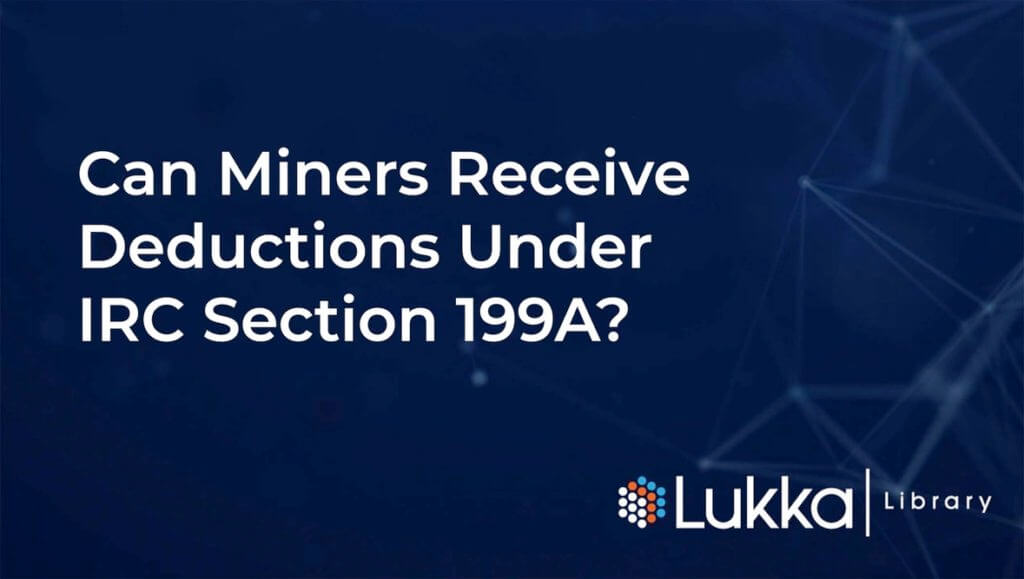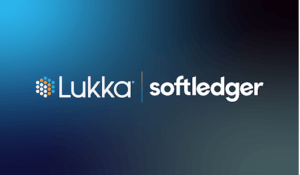Author: John Cunningham, McLane Middleton, P.A.1
I. Introduction and Summary
Persons (referred to in this Overview as “miners”), whether individuals or entities, that are subject to federal income taxation and that successfully engage in virtual currency mining–that is, in verifying data in blockchains –may receive fees for their mining services in the form of units of virtual currency.2 Under Internal Revenue Service Notice 2014-2, 2014-16 I.R.B. 938 (PDF) (the “IRS Notice”) and other IRS federal tax authorities, miners are subject to federal income tax on these payments. These taxes must be paid, of course, in U.S. dollars. The miners subject to these taxes include both U.S. citizens regardless of where they reside, and they may also include non-citizens who perform their mining services in the United States or who are otherwise subject to U.S. federal income taxation. However, if these miners meet the conditions summarized in Part III of this Overview, they may receive federal income tax deductions on these fees of up to 20 percent of their “qualified business income” from these services.
This Overview is intended to apply to virtual currency whether or not it is cryptocurrency. The Overview is based on the IRS Notice and on questions and answers about virtual currency transactions provided by the IRS in an October 9, 2019 publication entitled “Frequently Asked Questions on Virtual Currency Transactions,” Rev. Rul. 2019-24, 2019-44 IRB 1004 (the “IRS FAQs.)”
II. IRS Rules Concerning Payments and Receipt of Virtual Currency as Payment for Mining Services
The discussion below is based on the IRS Notice and the IRS FAQs.
1) General rule: virtual currency is property. As indicated, the IRS views the virtual currency paid or received for mining services by miners that are subject to U.S. federal income tax as property, and the IRS applies essentially the same rules to these payments and receipts as to payments and receipts of property for any other types of service.
2) Valuing receipts and payments of virtual currency. As with payments and receipts of any other form of property for services, miners must determine the value of the cryptocurrency that they pay or receive on the date of the payment or receipt, and the basis for this valuation must be the fair market value of the cryptocurrency in U.S. dollars on that date.
3) How to value payments and receipts of virtual currency. Payers and recipients of virtual currency for mining services must value the virtual currency in question in U.S. dollars on the basis of an exchange rate set forth established virtual currency exchange if one is available for the virtual currency in issue. In the absence of such an exchange, they may use any other reasonable method of valuation.
There are several websites that purport to offer assistance to miners and others in determining the dollar value of virtual currency. However, in the case of fair market value of payments and receipts of virtual currency to employees and independent contractors for mining services, a plausible standard might be the value that the payer or recipient would have received if the payment or receipt had been in dollars.
4) Federal income tax reporting of virtual currency received by miners who are sole proprietors. Miners who provide their mining services as individuals–i.e., in federal tax terms, as sole proprietors–must report their mining income and loss in dollars to the IRS annually in Schedule C of their IRS Form 1040 if their receipts total at least $400, and they must pay federal income tax and Self-Employment Tax on their mining income for the relevant taxable year.
5) Federal income tax reporting of virtual currency received by entities that provide mining services. Miners that provide their mining services through entities–i.e., through C corporations, S corporations or entities taxable as partnerships–must report their mining income or loss annually to the IRS as follows:
a) C corporations. If they conduct their businesses as entities subject to federal income tax under IRS Subchapter C, they must report it in IRS Form 1120.
b) S corporations. If they conduct their businesses as entities subject to federal income tax under IRS Subchapter S, they must report it in IRS Form 1120S.
c) Entities taxable as partnerships. If they conduct their businesses as entities taxable as partnerships, they must report it in In IRS Form 1065. Most multi member LLCs are taxable as partnerships, but some are taxable as C or S corporations.
6) Single-member LLCs whose members are individuals. The income of most single-member LLCs owned by individuals is taxable to the members of these LLCs as sole proprietorship income, but some single-member LLCs are taxable as C corporations or S corporations.
7) Tax character of receipts of virtual currency. The virtual currency received by individuals and entities for their mining services must be reported by them as ordinary income.
8) S corporation employees, etc. Individuals who provide their mining services as employees of entities that provide mining services that are taxable as S corporations must pay federal income taxes and FICA taxes on the dollar value of salaries, bonuses and other compensation paid to them by these S corporations in the form of virtual currency for their employment services. In addition:
a) If these individuals are shareholders of these corporations, they must pay federal income tax on their shares of the net income of these corporations paid to these corporations for their mining services in the form of virtual currency; and
b) These corporations must withhold federal income tax and FICA taxes on the salaries and other compensation paid by them to the above individuals in the form of virtual currency. They must value this virtual currency as its fair market value in U.S. dollars on the day of receipt of the compensation by the individuals as employees or shareholders..
9) C corporation employees, etc. Individuals who provide their mining services as employees of entities taxable as C corporations must pay federal income taxes on the dollar value of salaries, bonuses and other compensation paid to them by these corporations in the form of virtual currency for their employment services. In addition,
a) If these individuals are shareholders of these corporations, they must pay federal income tax on their shares of the net income of these corporations from mining services that are distributed to them in the form of cryptocurrency to them as shareholders; and
b) These corporations must withhold federal income tax and FICA taxes on the salaries and other compensation paid by them to these individuals. This virtual currency must be valued in dollars at its fair market value on the date of receipt.
III. Section 199A – Key Provisions as Applicable to Miners
The following is a summary of key terms and provisions of section 199A under the above IRS authorities as applicable to miners.
1) Effective date and expiration of section 199A. Section 199A became effective on January 1, 2018. By its terms, it will expire on December 31, 2025. However, because, as discussed further below, the section provides substantial deductions to tens of millions of owners of pass-through businesses, including miners, many tax professionals believe that before that date, Congress will extend it indefinitely.
2) Who may receive section 199A pass-through deductions? Section 199A pass-through deductions are primarily available to individuals who are subject to federal income tax and who do business as sole proprietors, as shareholders of S corporations, and as partners of partnerships. I will refer to these taxpayers as “qualified taxpayers.” Qualified taxpayers include sole proprietorships and owners of entities that engage in mining and that pay or receive virtual currency for mining services. Section 199A deductions are not available to shareholders of businesses taxable as C corporations.3 However, many C corporation shareholders can easily convert their businesses to pass-through entities and thus qualify for section 199A pass-through deductions.
3) “RPEs.” Mining business may be owned by “responsible pass-through entities” (“RPEs”). RPEs are pass-through entities that are owned by qualified taxpayers that do not engage in mining operations themselves, but that own business entities that do engage in mining. In other words, as applicable to mining, RPEs are holding companies owned by qualified taxpayers.
4) The section 199A “trade or business” requirement. Miners may receive section 199A pass through deductions from their shares of their business only if that business is a “trade or business” under section 199A. In general, a mining business will be a section 199A “trade or business” if, based on the case law under Internal Revenue Code section 162(a), its owners, employees, agents and independent contractors engage in the mining activities of the business for a bona profit motive and if they devote regular, continuous and significant time to it during the relevant taxable year. However, the case law under section 162(a) is based ultimately on the relevant facts and circumstances and thus is sometimes difficult to apply.
5) Computing the amount of section 199A pass-through deductions. The amount of the section 199A pass-through deductions available to qualified taxpayers depends primarily on their taxable income and on the section 199A “threshold amounts” and “phase-in ranges” applicable to them. These threshold amounts are subject to annual cost-of-living adjustments, but for 2020, the threshold amount applicable to married individuals filing jointly is $326,600 and for all other filers it is $163,600. For joint filers, the section 199A phase-in range (which is not subject to cost-of-living adjustments) is $100,000, and for all others it is $50,000.
For qualified taxpayers that do not exceed their threshold amount, the section 199A deduction is 20% of their “qualified business income.” Their qualified business income consists of their net business income less certain amounts specified by the IRS under IRS publications 8995 and 8995-A, including Self-Employment Tax and FICA taxes and contributions to qualified plans. For qualified taxpayers whose taxable income exceeds their threshold amount, the rules governing their section 199A pass-through deductions are complex, but, for many of them, it will be the lesser of:
6) Example. Thus, for example, miners who are sole proprietors whose joint taxable income in 2020 is solely derived from mining and whose qualified business income is $100,000 will be entitled to a section 199A deduction of $20,000.
7) Section 199A restructuring. However, in order to maximize their section 199A pass-through deductions, many business owners must radically restructure their businesses. For example, in order to maximize these deductions:
8) Virtual currency disclosure in Form 1040. The first line of the current draft of IRS Form 1040, Schedule 1 (“Additional Income and Adjustments to Income”) contains the following question, which must be answered “yes” or “no”:
At any time during 2019, did you receive, sell, send, exchange or otherwise acquire any financial interest in any virtual currency?”
If a taxpayer, including a miner, has in fact received such an interest during 2019 but answers “no” to the question or fails to answer it, this may trigger an IRS audit and an IRS deficiency notice, interest, penalties and criminal sanctions.
9) “Specified service trades or businesses.” Miners that engage not only in mining but also in businesses characterized under section 199A as “specified service trades or businesses ” (“SSTBs”), such as consulting, may receive lesser section 199A deductions than miners that engage exclusively in qualified trades or businesses,4 and in some cases these miners may receive no section 199A pass-through deductions at all. SSTBs include most of the classic professions, such as accounting and, as indicated, consulting. In my view, mining is unlikely to be viewed by the IRS as an SSTB, but the matter is not without doubt.
1 John Cunningham is an attorney of counsel to the law firm of McLane Middleton, P.A. His practice is focused on LLC law and tax and on advising clients on how to maximize the federal income tax deductions potentially available to them under Internal Revenue Code section 199A. His telephone number is (603) 856-7172. His e-mail address is [email protected]. The link to his website is www.llc199A.com.
2 As used in this Overview, the term “virtual currency” means online currency not recognized by any country as legal tender in that country. The IRS refers to virtual currency as cryptocurrency if cryptography is used to secure relevant transactions involving currency and that are digitally recorded on a distributed ledge, such as a blockchain. In this Overview, the term “virtual currency” included cryptocurrency.
3 Section 199A pass-through deductions are also to certain trusts, but since, in all probability, no miners conduct their mining through trusts, I will not discuss the availability of section 199A pass-through deductions to trusts in this Overview.
4 Under section 199A, qualified trades or businesses comprise all types of businesses that are not SSTBs and that do not consist of providing employment services.




